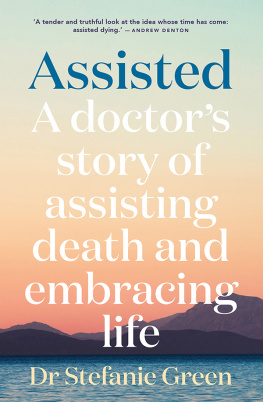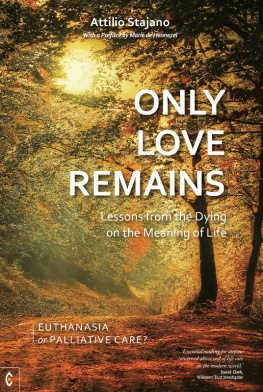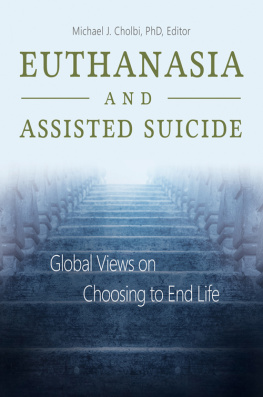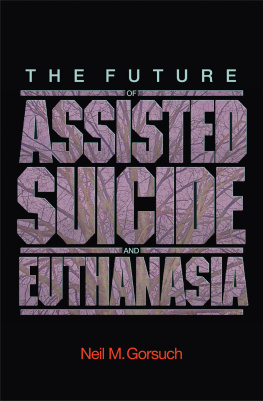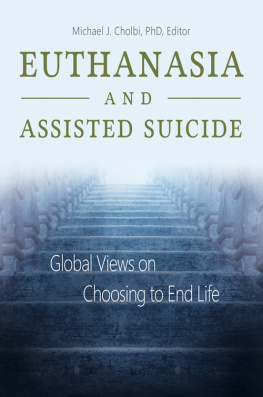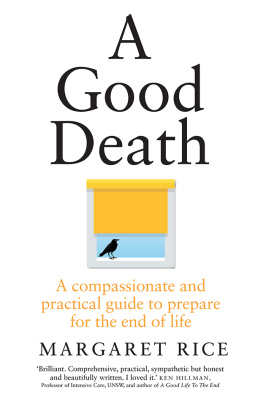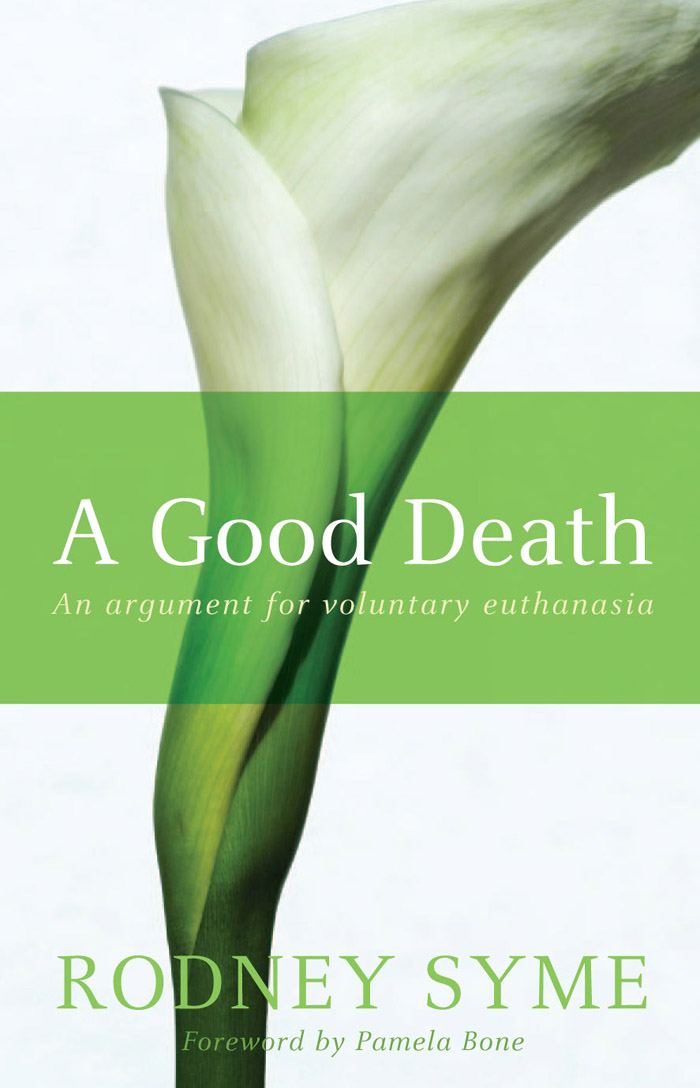A GOOD DEATH
A GOOD DEATH
An Argument for Voluntary Euthanasia
RODNEY SYME

FOREWORD
Our felt sense of what is real seems not to include our own death. We doubt the one thing that is not open to any doubt at all.
Sam Harris, The End of Faith
Its not curable. The usual outlook is one to eight years.
We all know, at one level, that one day we will die; but at another level we dont really, truly, believe it. Most of us, most of the time, dont think about it much. This is probably a healthy thing. You would never enjoy your life if you thought constantly about your death. Yet nearly all of us, unless we die suddenly in a car accident or pass away peacefully in our sleep, will some day be forced to confront the reality of our death: not at some vague, indeterminate time in the future, but soon.
In September 2004 I was forced to confront the reality of my death when I was told I had multiple myeloma, a cancer of the bone marrow, which was, and remains, incurable. People are different: their reactions to this kind of news are different. I did not rail against God, or fate, or ask, Why me? as others have told me they did. I considered it a matter of bad luck, nothing more. I did not even vow, as many do, to fight the cancer, to not let this thing beat me. I accepted, with sadness, that my life, for whatever was left of it, would never again be the same as the one I had known.
But while people react differently to the news that they have an incurable illness, there are also commonalities, as I have found from talking to others who have received a similar diagnosis. One is a wish that our dying will not be painful and protracted; more than dying, we fear what we might have to endure before we die. Another is a wish that we might die with dignity; none of us wants to think we will end our days sans speech, sans mobility, sans sense, being spoon-fed and toileted by our adult children, those same children we once spoon-fed and toileted.
Perhaps the most common reaction is the desire to take control. All but the most religious feel this. We are responsible adults. We have autonomy over every aspect of our lives. Why then should we not have autonomy in the matter of the ending of our lives?
We put our affairs in order as much as we can; we write our wills, if we have not already done so; we lie awake at night, planning our funerals. Yet we do these things with the fear that at the end, we will have neither autonomy nor control. The euphemism Dying with Dignity is in fact an accurate description of what most people want.
I am a journalist. I knew Dr Rodney Syme before I became ill. I had interviewed him in the past for articles I had written about what is variously called voluntary euthanasia, medically assisted suicide, dying with dignity legislation. A short time after I received my diagnosis, I contacted Dr Syme. He agreed to meet and talk with me. We met, several times, and after being convinced I was not mentally impaired, was not suffering depression and was not about to take my life at the first opportunity, Dr Syme helped me; he gave me the knowledge I needed to end my life peacefully and painlessly if and when it became unbearable. In giving me that knowledge, Dr Syme gave me peace of mind. It is, as he said, good palliative care.
I am aware of my privileged position, that many other people desire what I have. Opinion polls in recent years have shown that the majority of the populationconsistently, more than 70 per centwant the laws changed to allow people to be helped to die. Even religious people want this. A Newspoll in 2007 showed 74 per cent of Australian Catholics would support a doctor providing a lethal dose (not administering) to a person with intolerable and unrelievable suffering.
That is why A Good Death is a very necessary book. The proposals in it are not radical. Rodney Syme does not believe in euthanasia on demand. He does not believe that any person who would prefer to submit to God, or fate, in the matter of their dying, should ever feel pressured to do otherwise. His definition of voluntary euthanasia is: An action taken by, or at the request of, a rational, fully informed individual, whose intention is to be relieved of intolerable and otherwise unrelievable suffering, that hastens death in a dignified manner. This is also, despite the many case studies of distressing, painful and difficult end-of-life decisions, ultimately a hopeful book because it carries with it a sense of the inevitability of change: that those individuals who would impose on otherseven those who do not share their religious convictionsthe unwanted prolongation of life in futile and undignified circumstances will increasingly be seen to be acting invalidly.
The past two centuries have seen in Western societies an enormous expansion of human rights: the abolition of slavery, the ending of child labour, the emancipation of women, universal suffrage and, more recently, the growth of laws banning discrimination on the grounds of race, gender or age. It is an anomaly that, at the beginning of the twenty-first century, we still do not have the right to decide the timing and the manner of our dying.
This is surely a kindness this society, at this stage of its history, owes itself. For as Rodney Syme says, A right to live does not include an obligation to do so, under any or every circumstance. It is surely true that we can waive such a right, and this is the basis of our autonomy in end-of-life decisions.
Pamela Bone
CONTENTS
PREFACE
Voluntary euthanasia, or physician-assisted dying as I prefer to call it, is an intriguing subject to most people. It intrigues because it is about very fundamental matters that many people realise may one day concern them, but which they are reluctant to look at too closely. It also fascinates simply from an intellectual and philosophical level. Most people have a view about it, but without any personal experience of it. When they consider physician-assisted dying, they do so in an abstract and perhaps fearful way. What may be difficult for a non-sufferer in the abstract may however be crystal clear for a sufferer in practice. It is like a person trying to express a view about the game of cricket or baseball, when they have never seen a game and have not read the rules. Moreover, many of the people who write about the subject do so from a theoretical perspective, quoting the views of other authorities who are also quite likely never to have talked in detail with someone who has requested physician-assisted dying. It is also likely that these authorities have never been intimately involved in such assistance. It is a different story for the profound sufferer, who, being at the heart of the matter, can see the issue very clearly. All of the people whom I have helped to die, and discuss in this book, made unequivocal decisions about ending their own lives.
When Steve Guest, dying of oesophageal cancer, rang radio presenter Jon Faine to say that he wanted to end his life, Faine wondered why this could be so, as Steve sounded so rational, as though rational people could not consider ending their lives. Faine had not met Steve, and could not, on radio, visualise his wasting and his exhaustion. How could Faine, at that moment, understand Steves suffering? When they met, a week later, the absurdity of Faines earlier comment about rationality was revealed. His subsequent meeting with Steve would have done more than any reading of books or discussions with experts to bring an understanding of these issues. The people who take advantage of physician-assisted dying rarely leave accounts of the process, although fortunately Steve did. Moreover, since in most Western countries voluntary euthanasia is illegal, doctors are extremely loath to talk about their experiences.


